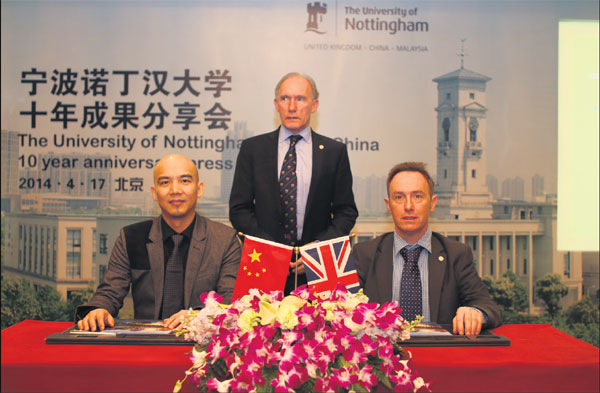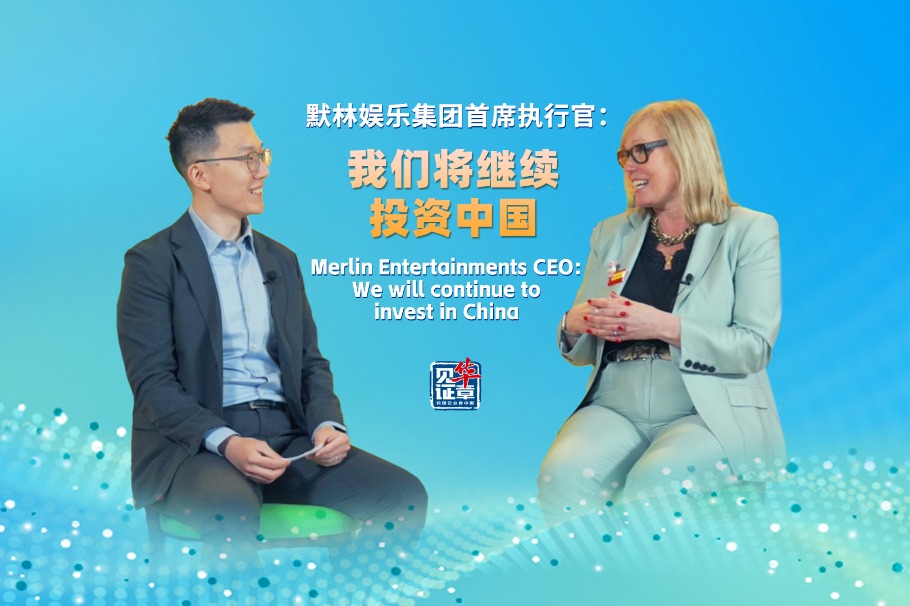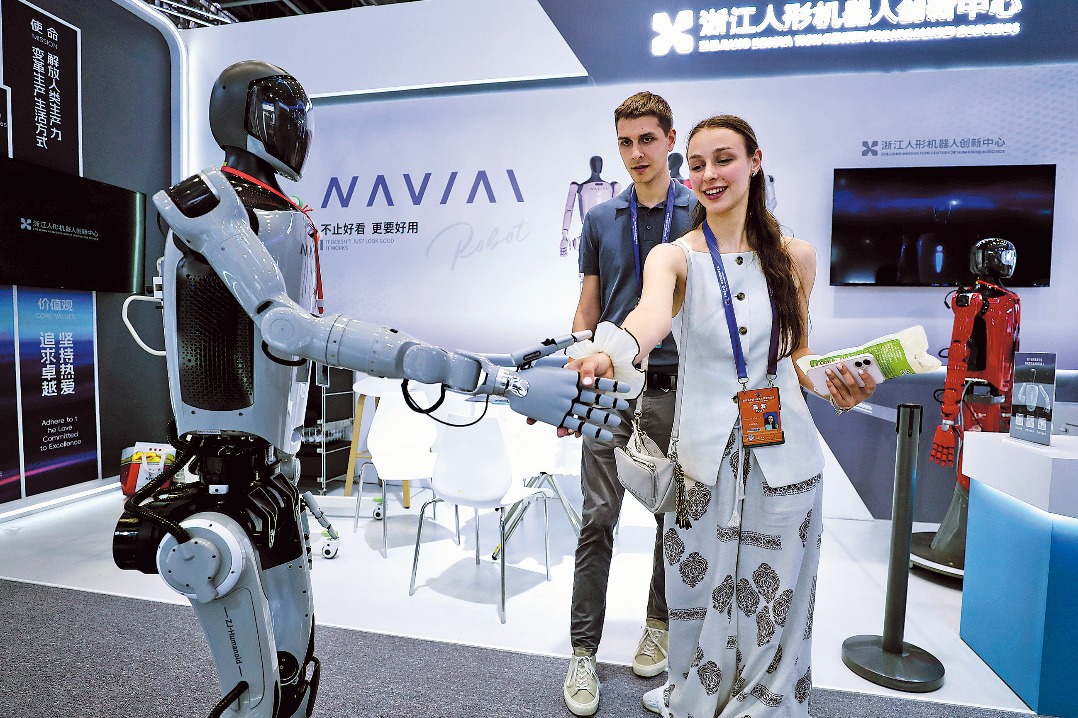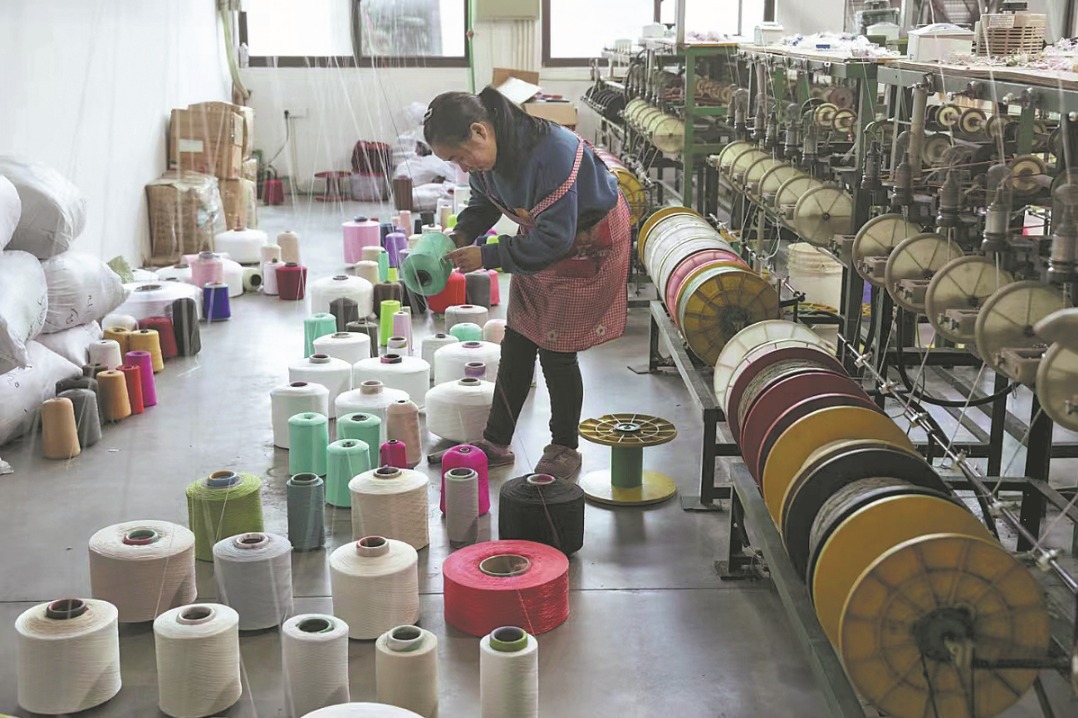UK experts help to drive a Chinese vision

Best Motion hopes its university research center will power nation's machines and robots of the future
When Tony Xu established the high performance drive system company Best Motion in 2015, he was keen from day one that the company should have a global perspective.
Instead of developing technology and products in China, he decided to establish a research and development center at the United Kingdom's University of Nottingham to develop high performance servo drive systems, which power motion in industrial machines and robots.
"Although we are a newly established company, our vision is to compete head-to-head with world-leading companies such as Siemens and ABB," says Xu.
| Tony Xu, founder of Shenzhen Best Motion Technology (left), signs an agreement to establish the company's R&D center at the University of Nottingham. Provided to China Daily |
Around 80 to 90 percent of the servo drive market is controlled by technology from Japan and Germany, so Chinese industrial technology companies have to import drives.
"To enter this market and develop an indigenous Chinese servo drive system technology, so that Chinese advanced manufacturing companies no longer have to rely on imported technology, is Best Motion's goal," says Xu.
Although Best Motion is in its early development stage, the company has already received private equity investment. In August, Tsinghua LH, the private equity fund established by Tsinghua University, invested 10 million yuan ($1.5 million, 1.3 million euros; £1.14 million) in Best Motion in the latest round of fundraising, valuing the company at 80 million yuan.
Best Motion's R&D work at the University of Nottingham is also bearing fruit, as prototypes are already being developed and production began last year. For the past six months, Best Motion has given its prototype products to some of China's robotics companies for trial.

"Some successful partners have placed small-scale orders. We plan to bring the products to display at the famous industrial show Hannover Messe in Germany next year. We hope to sell to an international market early in our development process, as high performance servo drive systems are greatly needed by many industries and companies around the world," Xu says.
The servo drive systems developed by Best Motion focus mostly on serving fast-growing technology sectors, including artificial intelligence, advanced manufacturing equipment and electric vehicles.
"Each of these sectors has huge potential for the market to take off, so our goal is to become the market leader in at least one of those areas," he says.
Earlier this year, China's State Council put its weight behind the country's development of artificial intelligence.
It vowed to make AI a key economic driving force for China by 2020, saying its application can help improve livelihoods as well as China's innovation capacity.
Best Motion has its roots in Shenzhen On Stone Technology, which was founded in 2003. On Stone specializes in providing automation management solutions to home appliance companies such as TCL and Midea. On Stone now employs more than 60 workers and generates annual revenue of around 600,000 to 800,000 yuan.
Riding on a trend of white goods market growth in China, On Stone grew rapidly in revenue, but Xu realized that an even bigger opportunity lies in the industrial servo drive systems market.
"The servo drive is the key component of industrial machinery. Therefore, as China rapidly develops its advanced manufacturing industry, the servo drive industry's scale will be huge. In addition, our proximity to our customers as a Shenzhen-based company could further help China's industrial development, as we will be quicker to respond to needs with our solutions," he says.
In 2015, Xu established Best Motion and invited the shareholders at On Stone to invest in the new venture.
At first, Xu says, finding a good overseas R&D partner was hard. "First we explored the opportunity to partner with Chinese universities for research, but we quickly realized that their research capabilities were insufficient for our needs. We then looked toward the possibility of finding German or Japanese partners for technology collaboration, but again we were refused by the companies we approached," he says.
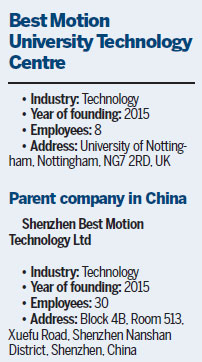
After some searching, Xu's team came into contact with the University of Nottingham, and Xu was immediately attracted by the R&D strength of the university's Power Electronics, Machines and Control Group.
The PEMC group has 150 members, and the innovation team will be working very closely with Best Motion to transfer technology and know-how and to acquire and train talent. The group already works with a large portfolio of Western companies, such as Airbus, Liebherr, GE Aviation, Boeing, Areva and Nissan, to develop technologies that could be commercialized.
Through mutual contacts, a meeting was arranged between Xu's team and the former head of PEMC, Greg Asher, who is also a professor at the university. "I felt an immediate connection. He believed in our vision, he appreciated the tremendous growth and opportunity to be afforded by China, and we both saw the natural path of long-term collaboration over the next 15 years," says Xu.
Building on trust and understanding, Best Motion invested £1.5 million ($2 million, 1.69 million euros) in building the research center in Nottingham.
The collaboration has not always been smooth. Xu is rooted in the fast-moving Chinese business world, while British academics can be focused more on innovation than commercialization.
"We are already quite long-term focused and understand that R&D cannot produce quick results, but sometimes it is inevitable to feel the pressure coming from the need to compete with concrete products. In the UK, however, academics often place a big emphasis on quality and pioneering research. Some of the researchers do not feel the pressure to commercialize technology quickly to withstand fierce completion," says Xu.
"There was a mutual learning process and, through communication and reflecting from each other's perspectives, we were able to move the collaboration forward despite the cultural difference."
Despite such challenges, Xu is optimistic about the future of Best Motion's servo drive systems in China because, he says, they offer value and reliability.
"But the bigger advantage we have is our proximity to market, and our understanding of the disruptive innovation taking place in China's high-tech industries," he says. "So we are able to upgrade our products much quicker to suit the needs of our customers."
cecily.liu@chinadailyuk.com
(China Daily Africa Weekly 10/20/2017 page30)
Today's Top News
- EU has much to learn from China-Global South ties
- Xi holds phone conversation with Merz
- Xi stresses high-quality cultural-ethical advancement
- Trump halts Harvard's intl student enrollment
- Xi's visit gives impetus to our work
- Financing support enhanced for micro, small companies
















